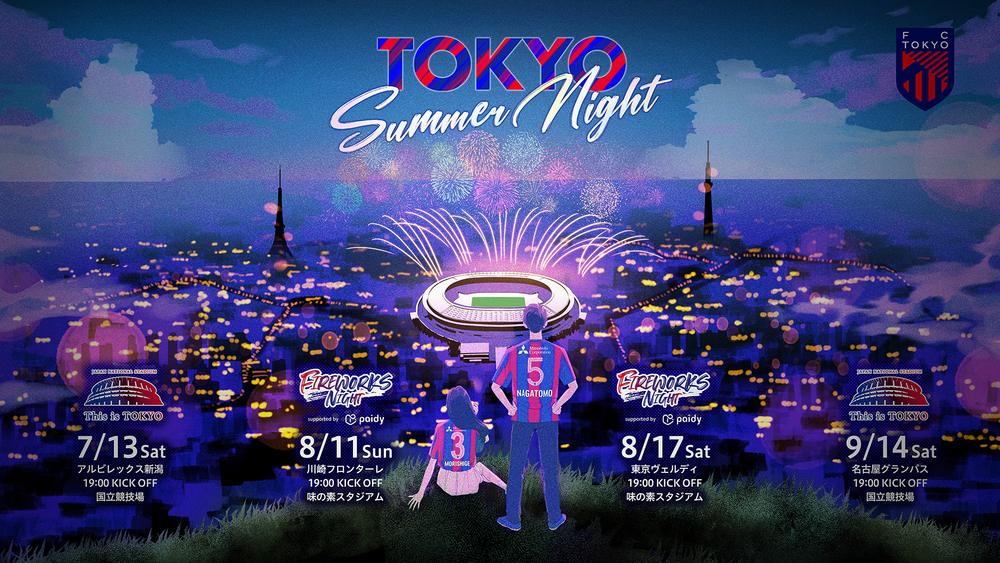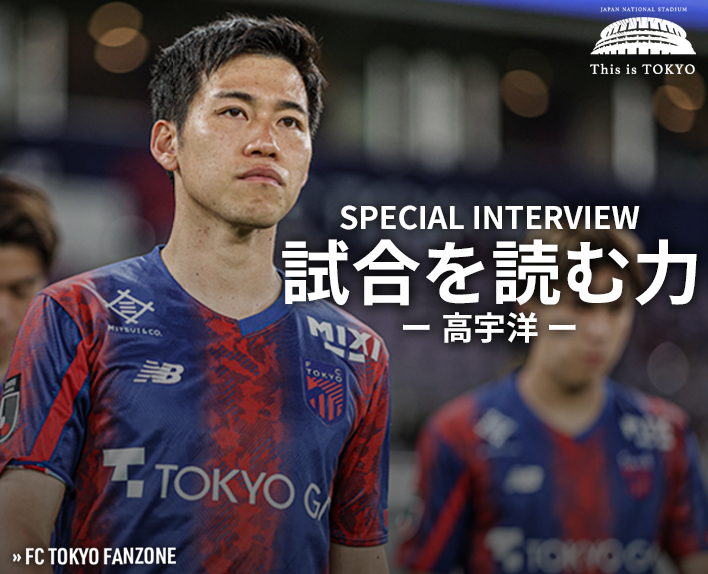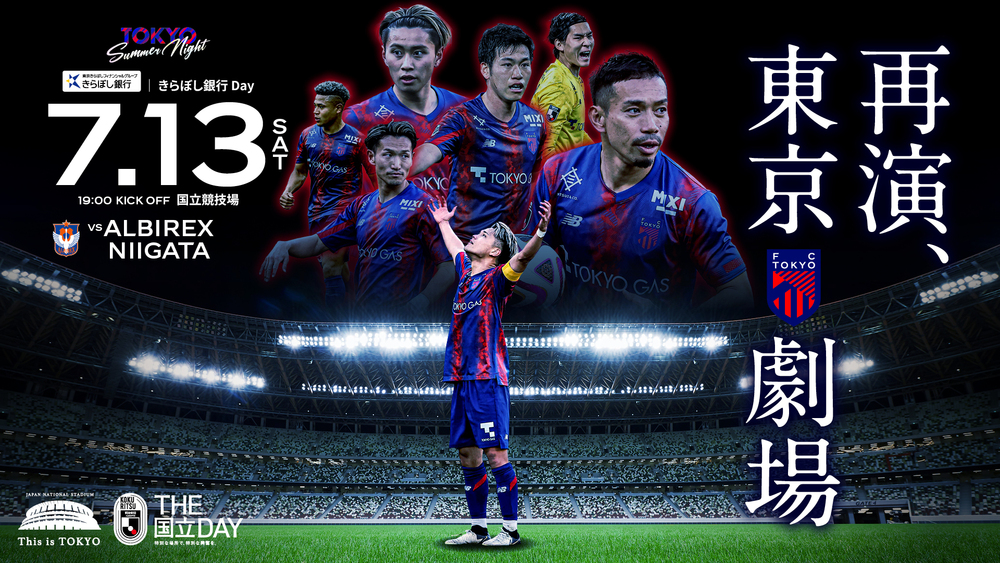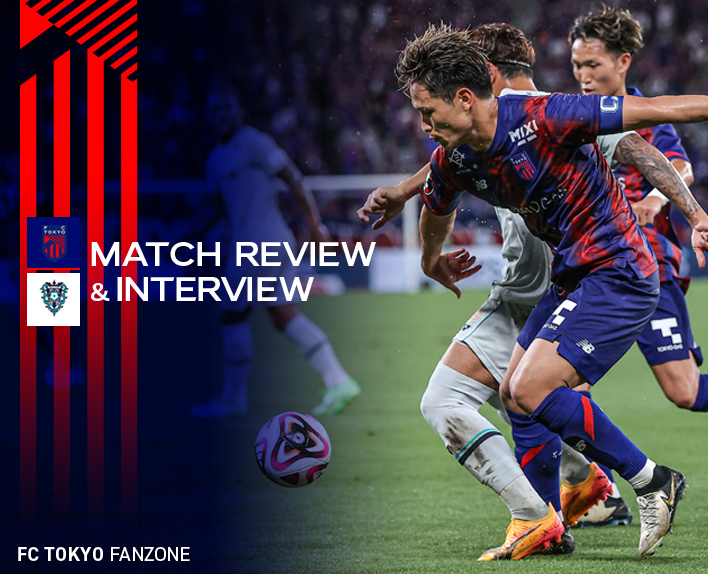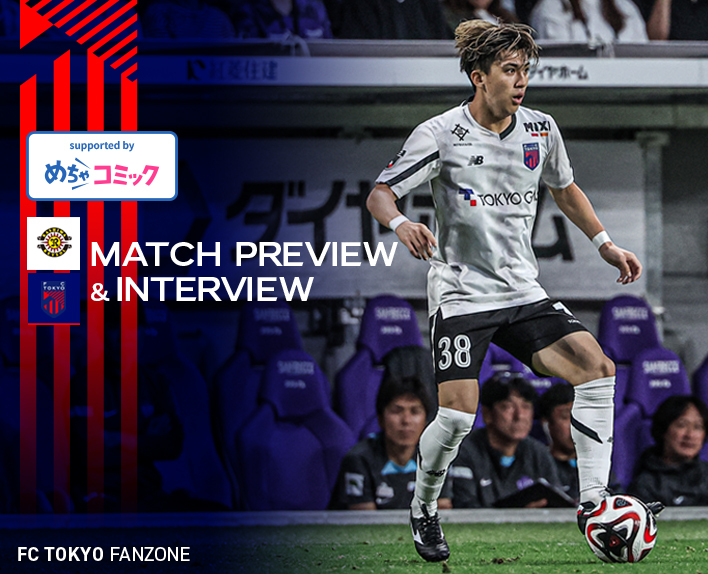Number 8 is in the center of the pitch.
Repeatedly gesturing widely to draw out the ball, he explores the switch for attack through a series of precise passes. If you watch a match in Tokyo, you will quickly notice his presence.
This season, Takahiro KO has completely transferred from Albirex Niigata. Although there was a period at the beginning of the season when he struggled to get playing opportunities, he made sure to deliver results when the chance came, becoming an indispensable presence as the blue-red "link man" who connects strong individuals.
His invisible weapon──. That is the ability to read the game. The team, which often decided matches based on individual abilities, is trying to add the ability to adapt and communicate in order to accumulate victories.
Both individuals and teams are still in the process of development. However, he clearly sees the path for Tokyo to become stronger.
Text = Tomo Aoyama
──First, how do you feel about the battles up to this point?
Looking back at the first half of the season, I feel that there were many matches where we could have done better, taken more points, and should have won. However, on the other hand, there were also matches where we managed to equalize in difficult situations and secured a draw. To move up further, it is absolutely necessary to minimize fluctuations and achieve consecutive wins. Additionally, I strongly believe that we need to win at home in the second half of the season, and I think that by doing so, we can move up.
──Looking back overall, it seems there are matches where we can play good football and others where we struggle to find ways to attack. Since the opening, what have we built up, and what challenges do you feel remain?
I really feel that too. As I mentioned earlier, there are ups and downs in terms of content. It depends on how aggressively we can start and challenge from the beginning. When things are going well, I think we can play our style of football and gain momentum. However, when things are not going well, we tend to be on the back foot and often struggle to challenge. I feel that when our willingness to receive the ball is weak and our reaction to second balls is slow, it becomes a difficult game.
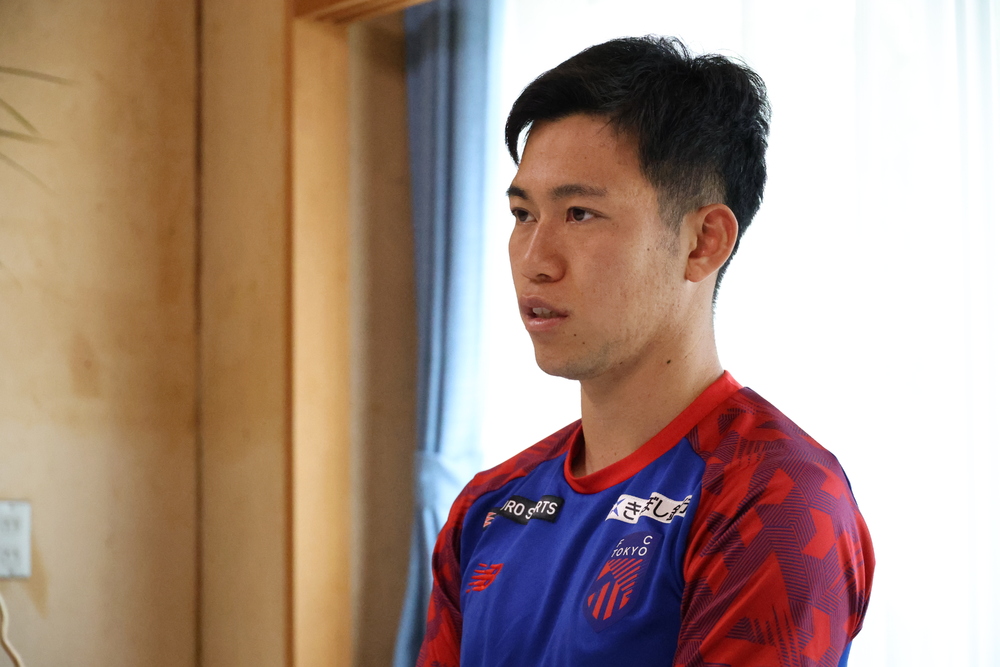
──I want to think about solving the issues there. My impression is that even in situations where we are connecting the ball, we struggle in matches where we can't make changes or switch to attacking mode after entering the attacking third.
From my perspective, I want to create a bit more rhythm, so if there are players who can be easily utilized, I think we should use them easily. If we can get behind the defense, I believe it's fine to run and use them easily. Tokyo has many players with high individual abilities, so there are situations where they can break through and create opportunities on their own. Of course, that's not a bad thing, so it would be great if we could differentiate between using individual strength and creating rhythm as a team. As we move into the summer, I think it's also important to consider our approach to the game.
──On the other hand, looking at the defense, I was concerned about the number of unnecessary goals conceded by the team.
Honestly, there were many easy goals conceded. There were few scenes where we were completely broken down, so most of the goals conceded were self-inflicted. I think that is a matter of concentration. Recently, those kinds of goals conceded have decreased, so I want to make adjustments so that each individual can take responsibility and improve.
──Conversely, if we reduce easy goals conceded, the team's performance will likely improve as well.
There is no doubt about it. I believe that by reducing the number of goals conceded, we can see improvement. The top teams have fewer goals conceded, so we must focus on that aspect. We have been able to improve little by little, and recently, I have the impression that we are becoming more committed in front of the goal and our concentration has increased.
──Player Takahashi transferred to Tokyo this season, and there was a time at the beginning of the season when he struggled to get playing opportunities.
The most difficult thing about transferring to Tokyo was playing while moving. Albirex Niigata had a team structure where each individual played while maintaining their positions. In Tokyo, however, it was more about the individual being free to move while connecting with others, which was challenging for me.
──In the 2024 Meiji Yasuda J1 League Sec. 4 match against Avispa Fukuoka, I had my first opportunity to play. By bringing the team its first victory of the season in this match, I will completely become the blue-red "link man" from there.
Personally, I really think that the match against Avispa Fukuoka was a turning point. I had heard that we hadn't won in Fukuoka for about 20 seasons, so I thought, "We have what it takes." I felt that we were gradually improving during the camp and practice matches, and since the team hadn't won in the first three matches of the season, I was preparing to be ready whenever I was called upon. Rather, I approached the match with the determination that "if I don't achieve results here, my life in Tokyo will be over." I believe it was a very good game in terms of both content and results, and I was able to show what I had prepared well.
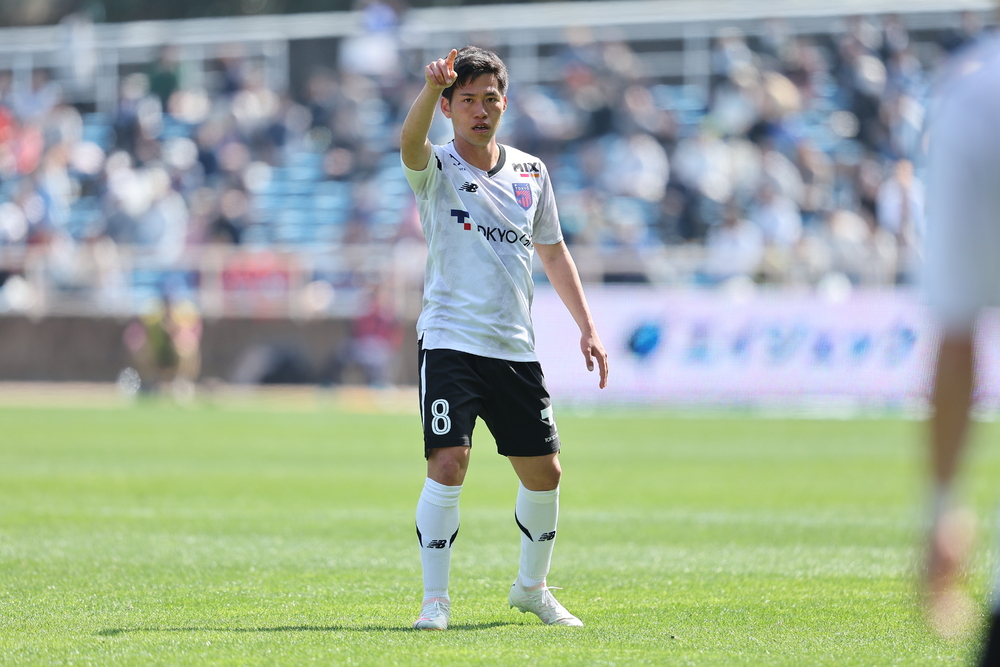
──As a holding midfielder, Takahashi is the link man for the team, and he gives the impression of constantly talking and gesturing instructions during the match. What do you see, feel, think, and keep in mind on the pitch? Please tell us about your thoughts and actions.
I believe that I am in a position to connect with those around me, so I must always be involved in both offense and defense. First and foremost, communicating is essential; I consider it the most important thing for me. What is necessary for that is the ability to “see.” Of course, it’s important to grasp the flow of the game during the match, but I also think about how to design the 90 minutes, how the team can move in a positive direction, and whether I can calculate backwards to win. It’s about how well I can sense the flow during the match. Since soccer involves opponents, while aiming for our own style of play, I try to communicate while considering the opponent's system and condition, as well as the situation of my teammates.
──As I mentioned earlier, I referred to you as a 'link man', and I have the impression that you connect the strengths of each player as a defensive midfielder.
Peter CKLAMOVSKI's soccer style is to attack quickly and vertically, but personally, I want to create a good rhythm there. It is absolutely necessary to differentiate between fast vertical attacks and those that control time and the ball. I have discussed this with the coach, who has told me, "You can make decisions on the pitch," so I am conscious of fighting organizationally while connecting well with the players around me.
──In the J1 League Sec. 21 match against Hokkaido Consadole Sapporo, I heard that in the second half, Riki HARAKAWA talked about how "the opponent's intensity has dropped, so it's time to make our move," and the team increased their pressure. Do you feel that you have developed the ability to read the flow of the game?
There are quite a few. Tokyo has many players with strong individual skills, and it's about how to connect that. I think Tokyo is a club that demands more victories, so I feel that I have really developed a sense of controlling the game to get closer to winning. During the match against Hokkaido Consadole Sapporo, I was talking with Muriqui, and I could really tell that the opponent relaxed during that time, so we discussed, "This is the moment to strike."
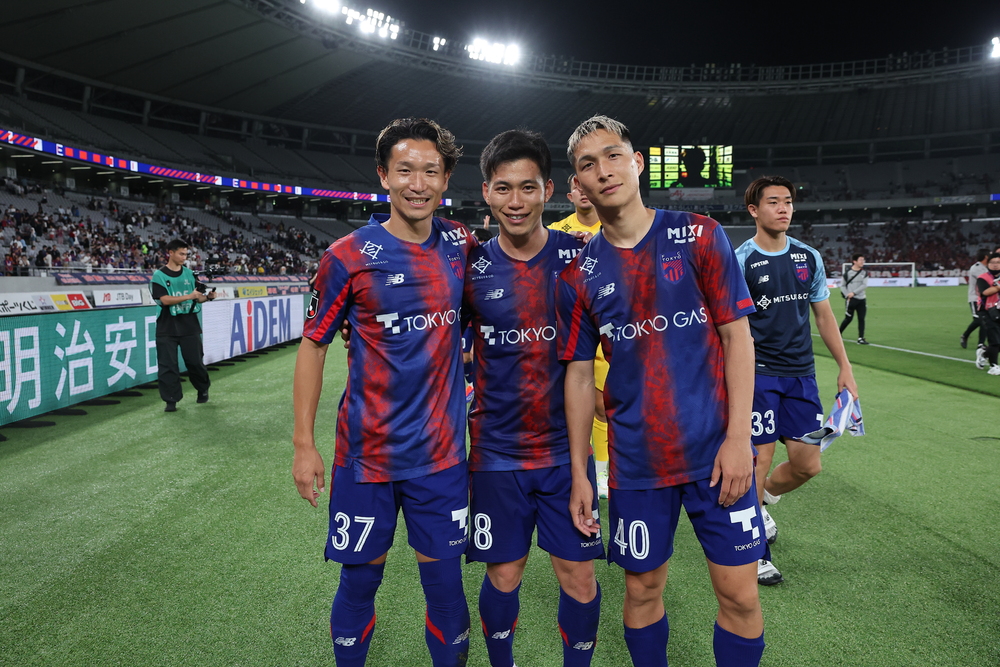
──Has coming to Tokyo changed your awareness in terms of being mindful of reading the flow of the game?
It has definitely changed. I have come to realize how important it is to observe those aspects as a defensive midfielder since coming to Tokyo.
──As the opponent takes measures against Tokyo, how can we manage when things are not going well? I think that will be a major point in the second half of the season.
There will definitely be games throughout the season where we are forced into a disadvantage, like the away Sec. 19 match against Shonan Bellmare. The ability to secure a win in such matches is extremely important, so earning 3 points there was significant. However, playing multiple games like that is physically and mentally tough (laughs). As I mentioned at the beginning, it’s crucial to reduce the fluctuations as much as possible. The team must firmly hold the difficult periods to zero. On top of that, it’s necessary to discuss and make adjustments during halftime or after the match, but the ability to sense and correct things from the atmosphere and rhythm during the game is absolutely essential. What actions we can take while making those adjustments will be very important from here on. We are gradually getting better at this, but there are still areas where we lack strength. So, not only as a team but also personally, I want to be more perceptive, communicate more, and help connect the team effectively.
──As a team, Takahashi's one-touch passes and vertical passes that change the rhythm are the switch for our attack.
This season, there seems to be an increase in balls that challenge in the attacking third. There have been scenes where this has successfully led to goals. With many strong players up front, I want to supply them with the ball in good situations while continuing to challenge. As long as we don't lose the ball poorly. Since we can regain possession when trying up front, I want to keep challenging while focusing on improving my individual quality.
──Well, on July 13th, there will be a match against Niigata at the Japan National Stadium.
I really think the atmosphere at the Japan National Stadium is wonderful. I was also impressed by the player entrance performance, and since many fans and supporters come, it boosts motivation. I noticed the projection mapping during the huddle. It's entertainment (laughs).
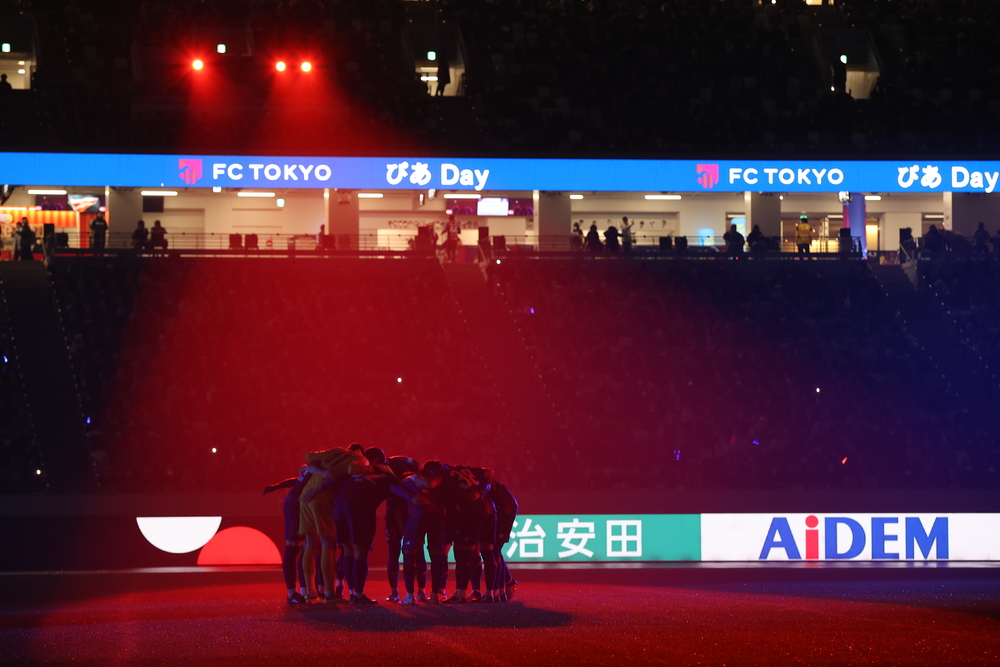
──Speaking of Japan National Stadium, there was the "phantom goal" in the Urawa Reds match (J1 League Sec. 7). It was a magnificent long-range shot, but...
That happened, didn't it? (Kuryu) MATSUKI was in an offside position, so it was canceled.
──I still haven't scored my first goal in Tokyo. While I have the impression of being the main pillar in creating the game, personally, don't you want to also contribute with finishes and assists that decide the match?
I definitely have the desire to aim for it, and since I haven't been able to take many shots, I think I should get into the goal area more. However, as a fundamental principle, I prioritize risk management and team balance, so it's more about taking chances when they arise.
──This season, the team is playing a style of football where the opposite full-back moves in for crosses from the side-back, so managing risks in the backline will be crucial.
That's right. This year, there are basically many scenes where the full-backs go up and enter the penalty area, so I think it's inevitable that we, as defensive midfielders, will often stay back to maintain balance. With that in mind, I want to focus on making decisive plays like the final pass and shots. I believe that if the defensive midfielders can score, it will make things easier for the team, so I want to always be conscious of aiming for long-range shots.
──The opponent is Niigata, my former club. We won the last match away.
I want to win this time and definitely achieve a season double. I often watch Niigata's matches, and I think they are a wonderful team. While valuing the aspects they have built up in connecting the ball, it gives the impression that both the players and staff are fighting without wavering.
──Now, how shall we take this down?
It's about where we set our line and how we apply pressure. When we faced them away, my plan worked quite well. It depends on the opponent's lineup, but I want to observe the flow on the pitch and think things through, and I hope to do well this time as well.
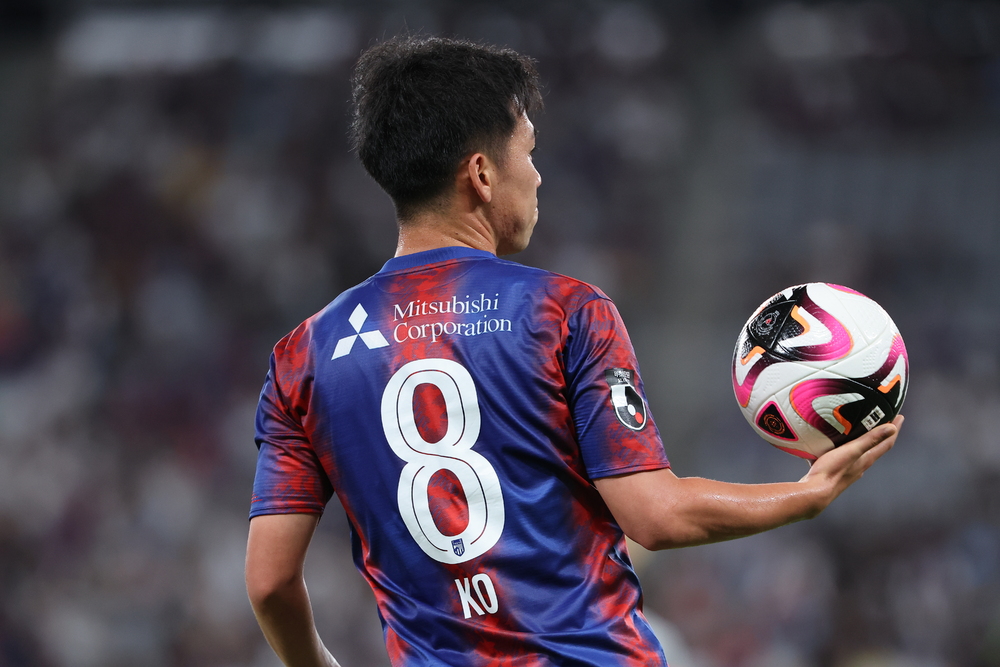
──Finally, what do you think about the potential that Tokyo has this season?
In the first half, there were games where we could have earned more points, so if we can develop the strength to win those matches and the strength as a team, we should be able to rise even higher. Also, the importance of winning at home is crucial. Starting the second half with a win against Sapporo at Ajinomoto Stadium, the match against Fukuoka, which was a home consecutive game, was definitely one we wanted to win, but we ended up losing. I really feel that we need to become a team that can consistently win those kinds of matches. I believe the term 'adaptability' will continue to be a keyword, so as a team and as individuals, we need to be more flexible and aware of our opponents. Personally, I want to make a stronger presence both offensively and defensively. First, I want to focus on winning each match without getting too emotional, keeping my feet on the ground, and aiming to win every single game.
